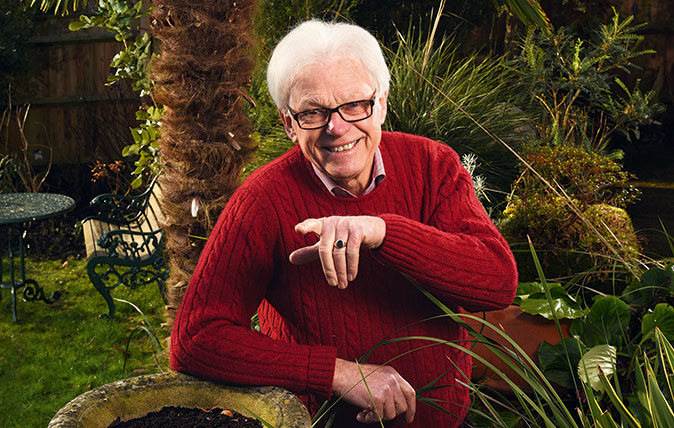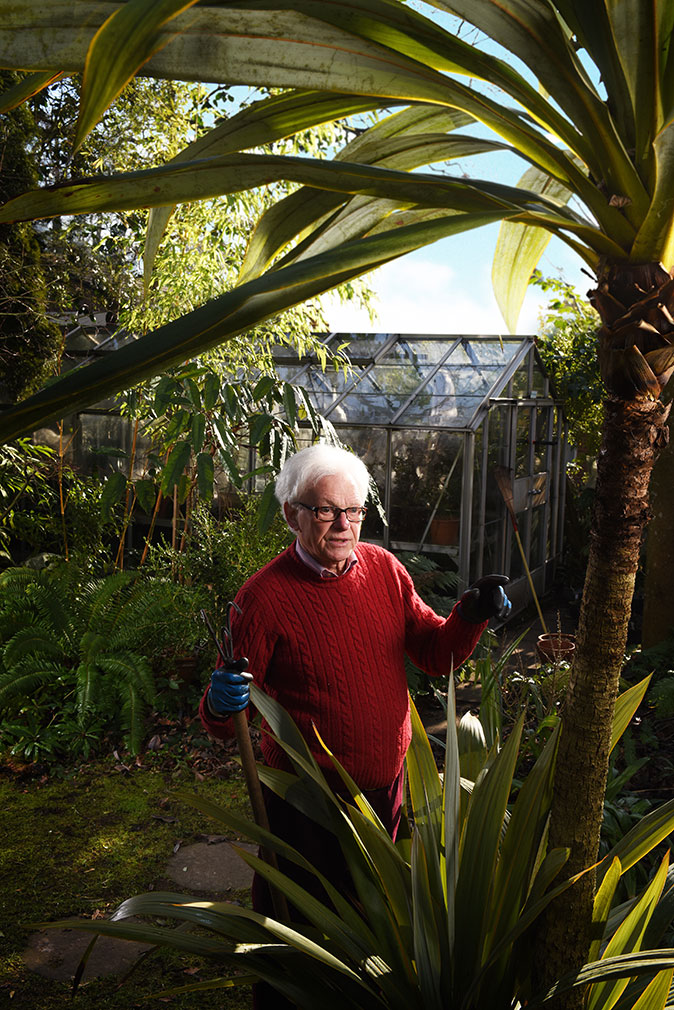Roy Lancaster: 'The world would be a better place if politicians were forced to spend time gardening'
Jonathan Self caught up with Roy Lancaster, one of the most recognisable faces in British gardening.


Roy Lancaster devotes 42 pages of his new memoir to his National Service. This was largely spent in the Borneo rainforest, where he was under constant threat of being attacked by Communist terrorists. He allocates an entire sentence to the experience: ‘Much of our time was spent on local patrols, occasional ambushes and more extended operations in deep jungle.’
Of considerably greater interest to him were the flora and fauna. Crawling through dense undergrowth with the enemy on every side, he stops to ‘examine and collect wild pitcher (Nepenthes albomarginata)’. Encountering a tribesman carrying a blowpipe and poisoned darts, he befriends him, asks to try out the pipe and notes that the poison ‘apparently comes from the sap of the Ipoh tree (Antiaris toxicaria), a member of the mulberry family’.
Mr Lancaster is 80 this year and I formed the impression that he probably hasn’t changed much in the past six decades. He was obsessed with Nature as a small boy; he’s still obsessed. He was so fit as a teenager that he was offered a position as a gym teacher and he looks as if he would still be up to the job. He was sociable from a young age and it’s clear from the constant references to his family, mentors, colleagues and friends that people still come first in his life.
The offhand way in which he describes his combat experience is typical of his modesty. It’s not that false, self-deprecating modesty we British learn before we can walk and it’s not humility, either. Mr Lancaster clearly believes that his extraordinary intelligence, memory, knowledge and ability to communicate are not particularly remarkable. When I ask about being a household name, writing bestsellers, presenting countless television series and receiving public recognition, he appears nonplussed, as if I must have my facts wrong.
I’m getting ahead of myself, however. I am an unashamed Roy Lancaster fan. I’ve listened to him on radio, watched him on TV and read all his books. I was delighted when an excuse came along to interview him because, although Mr Lancaster almost instantly became a national treasure after his first appearance on Gardeners’ World in 1981, he has spoken and written little about his personal life.

I can reveal that he lives in Hampshire. Not, as one might expect, in an old rectory surrounded by rolling acres, but in a Victorian house on a wide, leafy suburban street with a plot that’s a mere third of an acre. ‘We often thought of moving to the country so that we could have a larger garden, but I came to the realisation that I have no interest, per se, in the acquisition of plants. What fascinates me is finding them, learning about them, seeing them. I don’t need to own them to enjoy them. Anyway, we love it here.’
‘We’ are his wife, Sue, and himself. ‘Sue is my partner in every sense of the word. I couldn’t have achieved anything without her. She gave up teaching so that we could work together.’ When I tell him I was touched by the references to her in his autobiography – for example, the way in which he decorated the church for their wedding – he immediately starts listing the plants: ‘Over the porch, there was New Zealand flax, Phormium tenax, with its sword-shaped leaves combined with a large ruff of the rich red Mahonia japonica. As you entered…’
Exquisite houses, the beauty of Nature, and how to get the most from your life, straight to your inbox.
Mr Lancaster describes plants the way others describe people. He laughs: ‘Well, that’s not surprising. Like people, they have distinct appearances, personalities, likes and dislikes.’ Later, he refers to someone who had chopped down a healthy tree that blocked his view as ‘a murderer’. Perhaps it isn’t surprising, given his life with plants, that he comes across as a rather gentle man.
Mr Lancaster was born in Bolton. His parents worked in the cotton mills and his father, who grew roses, bred in him a love of gardening. His plan on leaving school at 15 was to become an engine driver, but the curator of the Bolton Museum suggested he become a gardener and found him a place at Moss Bank Park.
He worked for Bolton Parks Department and, in 1960, went to Cambridge to study botany. From there, he worked at the famous Hillier and Sons Nurseries in Winchester until 1980, when he went freelance.
Travel has been a major theme. His heroes are the early plant hunters such as E. H. Wilson – only, as he explains, I ought not to call them hunters: ‘A hunt ends with a kill. Discovering a new plant is not about death, but about life.’
Like Wilson, Mr Lancaster returned repeatedly to China, although there’s barely a country in the world that he hasn’t visited. He can recall each trip as if it happened yesterday.
‘Iran?’ I ask. ‘November 1972 to help plan the country’s first botanic garden and, of course, to explore for plants.’
‘Jordan?’ ‘In July 1990, I was summoned in great secrecy to save some dying trees in one of the royal palace gardens, only they turned out to be plane trees that were simply shedding their bark.’
He follows world events, although he finds them depressing. ‘How much better it would be for the world if politicians were forced to spend some time gardening. When you garden, you have to plan, you have to focus on the future.’
His own plot brings him untold pleasure. ‘Every morning, Sue and I throw open the curtains and gaze down at it. It’s like a stage set and each plant plays a different character.’
I find I’ve used up the available space without even beginning to explain properly how kind he is (he must have asked me quite as many questions as I asked him) or portraying his exuberance. His parting words give a good clue to his personality, however: ‘Give me a packet of seeds and I’m happy.’
- - -
Interview by Jonathan Self. Roy Lancaster’s My Life with Plants is published by the RHS (£25)
Country Life is unlike any other magazine: the only glossy weekly on the newsstand and the only magazine that has been guest-edited by His Majesty The King not once, but twice. It is a celebration of modern rural life and all its diverse joys and pleasures — that was first published in Queen Victoria's Diamond Jubilee year. Our eclectic mixture of witty and informative content — from the most up-to-date property news and commentary and a coveted glimpse inside some of the UK's best houses and gardens, to gardening, the arts and interior design, written by experts in their field — still cannot be found in print or online, anywhere else.
